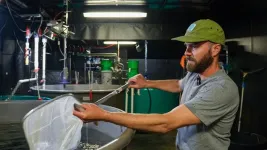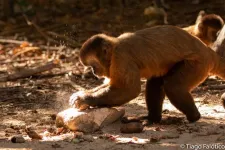(Press-News.org) DULUTH, Minn.–Fish farmers across the Great Lakes states can face a confusing web of permits, policies and regulations that can hinder the growth of their operations. A new Sea Grant publication, Aquaculture Regulations in the Great Lakes, offers much-needed clarity.
The report breaks down complex legal frameworks and provides practical insights to help aquaculture producers understand and navigate state and regional requirements with greater confidence. It was developed by the National Sea Grant Law Center (NSGLC) in partnership with the Minnesota Sea Grant-led Great Lakes Aquaculture Collaborative (GLAC), which formed to support aquaculture in the eight Sea Grant programs that border the Great Lakes and Lake Champlain Sea Grant.
"Understanding the regulatory landscape is crucial for the growth and sustainability of aquaculture in the Great Lakes region," said Amy Schrank, MNSG extension leader, fisheries and aquaculture extension educator, and GLAC project lead. "This publication serves as a valuable resource for fish farmers and policymakers to navigate a complex legal environment and identify opportunities for harmonization and improvement."
The comprehensive report offers an in-depth analysis of the legal frameworks governing aquaculture across the eight Great Lakes states and Lake Champlain and aims to support the development of an environmentally responsible and sustainable aquaculture industry in the region. The report and appendices provide an overview of each state’s existing aquaculture laws, regulations and policies.
The report involved an examination of state laws, permitting requirements, approved and prohibited species and health requirements relating to aquaculture. The report also included select state environmental laws, regulations and permits that may implicate aquaculture production, including water withdrawal, pollutant discharge, wetlands and right-to-farm laws.
The report’s analysis identified commonalities, differences and potential gaps that may present challenges to aquaculture operations across the Great Lakes region. The findings are intended to enhance understanding and facilitate informed decision-making among fish farmers, regulators, stakeholders, policymakers and others involved in aquaculture.
This report on aquaculture regulations and other Great Lakes aquaculture resources are available on Sea Grant’s Great Lakes Aquaculture Collaborative resources webpage.
ADDITIONAL INFORMATION:
Minnesota Sea Grant is a systemwide program of the University of Minnesota and one of 34 federal-university Sea Grant partnerships across the country supported by the National Oceanic and Atmospheric Administration in Great Lakes and coastal states that encourage the wise stewardship of our marine resources through research, outreach, communication, education and technology transfer.
The National Sea Grant Law Center, based at the University of Mississippi School of Law, provides legal research, education, and outreach on ocean, coastal, and Great Lakes resources. As part of the National Sea Grant College Program, the NSGLC works to address legal issues affecting the nation's coastal communities and ecosystems.
Sea Grant Great Lakes Aquaculture Collaborative (GLAC) provides aquaculture producers and consumers, educators and teachers, legislators and policymakers, and folks interested in raising, selling, eating, and stocking fish and other aquatic organisms in the Great Lakes region with science-based information, resources, and expertise.
CONTACT:
Amy Schrank, Extension Program Leader and Fisheries and Aquaculture Extension Educator, Minnesota Sea Grant, University of Minnesota and University of Minnesota Duluth, aschrank@umn.edu.
Terra Bowling, Senior Research Counsel, National Sea Grant Law Center, tmharget@olemiss.edu, 662-915-7775.
Marie Thoms, Communications Director, Minnesota Sea Grant, University of Minnesota and University of Minnesota Duluth, methoms@d.umn.edu.
END
New sea grant report helps great lakes fish farmers navigate aquaculture regulations
This Sea Grant publication will serve as a valuable resource for fish farmers and policymakers navigating the complex legal environment of aquaculture
2025-04-03
ELSE PRESS RELEASES FROM THIS DATE:
Strain “trick” improves perovskite solar cells’ efficiency
2025-04-03
Solar energy is one of the most promising solutions for reducing our dependence on fossil fuels. But making solar panels more efficient is a constant challenge. Perovskite solar cells (PSCs) have been a game-changer, offering rapid improvements in efficiency and potential for low-cost manufacturing. However, they still suffer from energy losses and operational stability issues.
The challenge with wide-bandgap perovskites
Perovskite solar cells, particularly those used in tandem configurations, rely on wide-bandgap (WBG) materials—semiconductors that absorb higher-energy ("bluer") ...
How GPS helps older drivers stay on the roads
2025-04-03
How GPS helps older drivers stay on the roads
Peer reviewed – observational study - humans
Sat Nav systems help keep older drivers on the roads for longer, according to new research from the University of East Anglia.
A new study published today reveals that over 65s with a poorer sense of direction rely more on help from GPS navigation systems such as Sat Nav or smartphone maps.
Those using GPS tended to drive more frequently - suggesting that the technology helps older people maintain driving independence.
Senior author Prof Michael Hornberger, from UEA’s Norwich Medical School, said: “Driving is usually the preferred mode of transport among ...
Estrogen and progesterone stimulate the body to make opioids
2025-04-03
Scientists have discovered a new mechanism that acts via an immune cell and points toward a different way of treating chronic pain.
Female hormones can suppress pain by making immune cells near the spinal cord produce opioids, a new study from researchers at UC San Francisco has found. This stops pain signals before they get to the brain.
The discovery could help with developing new treatments for chronic pain. It may also explain why some painkillers work better for women than men and why postmenopausal ...
Dancing with the cells – how acoustically levitating a diamond led to a breakthrough in biotech automation
2025-04-03
Engineers at a University of Bristol spin-out company have created a new technology that can move cells without touching them, enabling critical tasks that currently require large pieces of lab equipment to be carried out on a benchtop device.
The invention could accelerate the discovery of new medicines and unlock personalised medicine screening in clinics.
The groundbreaking concept was unveiled for the first time today in an article in Science published by Dr Luke Cox, where he describes his journey from University of Bristol ...
Machine learning helps construct an evolutionary timeline of bacteria
2025-04-03
University of Queensland scientists have helped to construct a detailed timeline for bacterial evolution, suggesting some bacteria used oxygen long before evolving the ability to produce it through photosynthesis.
The multinational collaboration – led by researchers from the Okinawa Institute of Science and Technology, the University of Bristol, Queensland University of Technology and UQ – focused on how microorganisms responded to the Great Oxygenation Event (GOE) about 2.33 billion years ago, which changed ...
Cellular regulator of mRNA vaccine revealed... offering new therapeutic options
2025-04-03
A team of researchers led by Dr. KIM V. Narry, director of the Center for RNA Research at the Institute for Basic Science (IBS), has uncovered a key cellular mechanism that affects the function of mRNA vaccines and therapeutics. Their study, recently published in Science, provides the first comprehensive understanding of how mRNA vaccines are delivered, processed, and degraded within cells—a breakthrough that could pave the way for more effective vaccines and RNA-based treatments.
Messenger RNA (mRNA) is the genetic blueprint that tells cells how to produce proteins. It plays a vital role in mRNA vaccines, such as those used for COVID-19, and is also a promising ...
Animal behavioral diversity at risk in the face of declining biodiversity
2025-04-03
Our environment is changing rapidly, largely as a result of human activities, leading to a significant decline in biodiversity. According to researchers from the University of Victoria and the Max Planck Institute for Evolutionary Anthropology, this decline does not only affect animal life, but also our understanding of their behavior, including tool use.
"Cultural behaviors range from the songs of whales to the tool use of primates," says Ammie Kalan of the University of Victoria. "These adaptations to environmental change not only benefit the animals, but also provide important insights into the origins of behavior and learning across species. However, shrinking ...
Finding their way: GPS ignites independence in older adult drivers
2025-04-03
GPS tech may empower older adults to be more adventurous on the road, according to a study published April 3, 2025 in the open-access journal PLOS Digital Health by Sol Morrissey from the University of East Anglia and colleagues.
Driving is older adults’ preferred transportation method, but age-related cognitive decline can limit time spent behind the wheel. Empowering older adults to be more mobile drivers (that is, driving more frequently and for longer distances) is critical to boosting physical, social and cognitive wellness. Electronic navigation systems ...
Antibiotic resistance among key bacterial species plateaus over time
2025-04-03
Antibiotic resistance tends to stabilize over time, according to a study published April 3, 2025 in the open-access journal PLOS Pathogens by Sonja Lehtinen from the University of Lausanne, Switzerland, and colleagues.
Antibiotic resistance is a major public health concern, contributing to an estimated 5 million deaths per year. Understanding long-term resistance patterns could help public health researchers to monitor and characterize drug resistance as well as inform the impact of interventions on resistance.
In this study, researchers analyzed drug resistance in more than 3 million bacterial samples collected across ...
‘Some insects are declining but what’s happening to the other 99%?’
2025-04-03
Insects are the dominant form of animal life on our planet, providing humans and wildlife with pollination, food, and recycling services but, despite concerns about population declines, little is known about how 99% of species globally are faring.
A new approach is needed to better monitor species and protect them from the impacts of climate and land use change, pollution and invasive non-native species as soon as possible, according to a study led by the UK Centre for Ecology & Hydrology (UKCEH) and ZSL (Zoological Society of London).
The researchers, whose work has been ...
LAST 30 PRESS RELEASES:
Spiritual practices strongly associated with reduced risk for hazardous alcohol and drug use
Novel vaccine protects against C. diff disease and recurrence
An “electrical” circadian clock balances growth between shoots and roots
Largest study of rare skin cancer in Mexican patients shows its more complex than previously thought
Colonists dredged away Sydney’s natural oyster reefs. Now science knows how best to restore them.
Joint and independent associations of gestational diabetes and depression with childhood obesity
Spirituality and harmful or hazardous alcohol and other drug use
New plastic material could solve energy storage challenge, researchers report
Mapping protein production in brain cells yields new insights for brain disease
Exposing a hidden anchor for HIV replication
Can Europe be climate-neutral by 2050? New monitor tracks the pace of the energy transition
Major heart attack study reveals ‘survival paradox’: Frail men at higher risk of death than women despite better treatment
Medicare patients get different stroke care depending on plan, analysis reveals
Polyploidy-induced senescence may drive aging, tissue repair, and cancer risk
Study shows that treating patients with lifestyle medicine may help reduce clinician burnout
Experimental and numerical framework for acoustic streaming prediction in mid-air phased arrays
Ancestral motif enables broad DNA binding by NIN, a master regulator of rhizobial symbiosis
Macrophage immune cells need constant reminders to retain memories of prior infections
Ultra-endurance running may accelerate aging and breakdown of red blood cells
Ancient mind-body practice proven to lower blood pressure in clinical trial
SwRI to create advanced Product Lifecycle Management system for the Air Force
Natural selection operates on multiple levels, comprehensive review of scientific studies shows
Developing a national research program on liquid metals for fusion
AI-powered ECG could help guide lifelong heart monitoring for patients with repaired tetralogy of fallot
Global shark bites return to average in 2025, with a smaller proportion in the United States
Millions are unaware of heart risks that don’t start in the heart
What freezing plants in blocks of ice can tell us about the future of Svalbard’s plant communities
A new vascularized tissueoid-on-a-chip model for liver regeneration and transplant rejection
Augmented reality menus may help restaurants attract more customers, improve brand perceptions
Power grids to epidemics: study shows small patterns trigger systemic failures
[Press-News.org] New sea grant report helps great lakes fish farmers navigate aquaculture regulationsThis Sea Grant publication will serve as a valuable resource for fish farmers and policymakers navigating the complex legal environment of aquaculture




